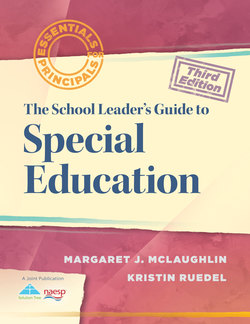Читать книгу School Leader's Guide to Special Education, The - Margaret J. McLaughlin - Страница 9
На сайте Литреса книга снята с продажи.
ОглавлениеCHAPTER 2
Determining Who Is Eligible for Special Education
Questions Principals Ask
• Who is eligible for services under IDEA?
• How is the decision made to evaluate a child?
• What information must be collected?
• What is RTI?
Eligibility for special education is contingent on two criteria. First, a student must be determined to have one or more of the disabilities specified under IDEA, and second, that disability must adversely impact the student’s educational performance.
IDEA includes the following disability categories (Assistance to States for the Education of Children With Disabilities, 2010a):
• Intellectual disability
• Hearing impairment
• Deafness
• Speech or language impairment
• Visual impairment (including blindness)
• Serious emotional disturbance
• Orthopedic impairment
• Autism
• Traumatic brain injury
• Specific learning disability
• Other health impairment, including attention deficit disorder and Tourette syndrome
• Deaf-blindness
• Multiple disabilities
• Developmental delays (children ages three through nine)
